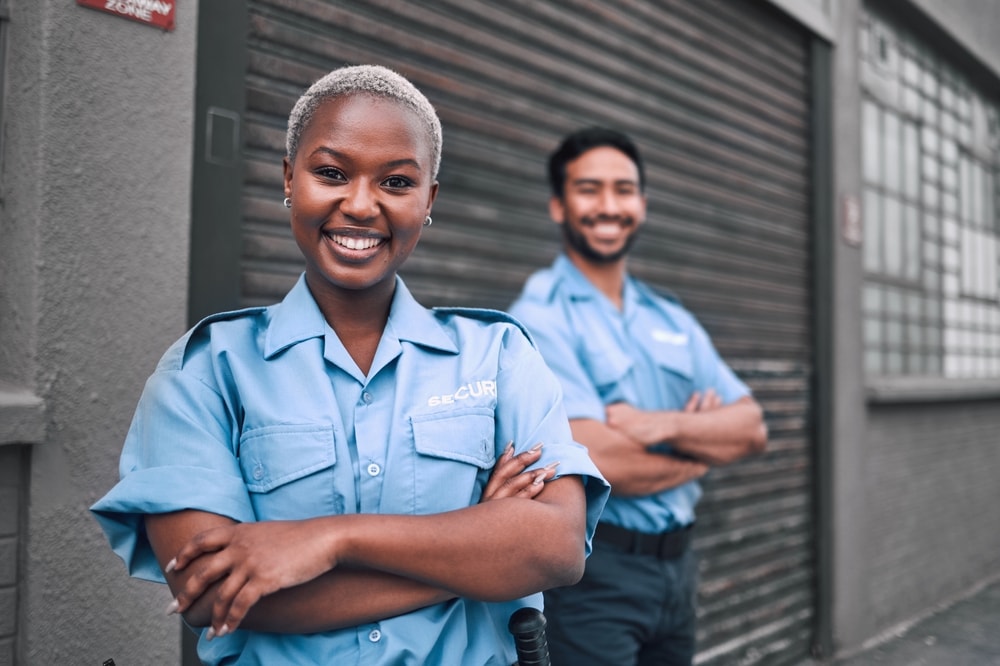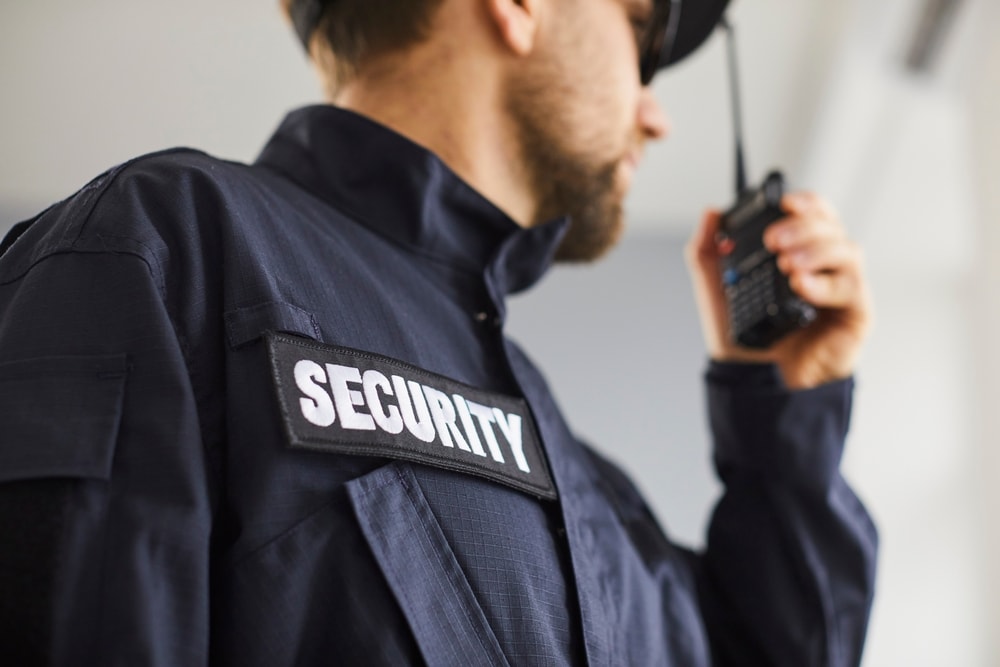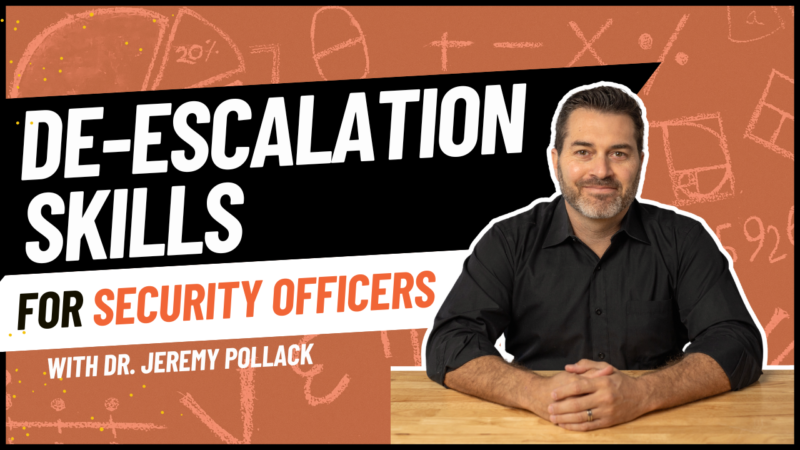Table of content
The role of a security guard is far more nuanced than simply patrolling premises or standing at checkpoints. To excel, professionals in this field need a variety of security skills that reflect their ability to adapt to evolving challenges, ensure safety, and address emergencies.
Whether protecting property, enforcing protocols, or addressing breaches, a security guard’s effectiveness hinges on a combination of mental acuity, physical readiness, and customer service skills that enhance their interpersonal finesse.
In this blog, we will explore the key security officer skills you should include in your resume and practical ways to develop them further. By doing so, you can position yourself as a standout candidate in the competitive security industry while ensuring a safe environment for those you serve.
1. Observational Skills
One of the most fundamental security guard skills is the ability to observe and assess surroundings effectively. Observation ensures that security officers can identify potential threats before they escalate into critical issues.
From monitoring surveillance cameras to conducting patrols, having keen observational skills allows security officers to stay ahead of problems, mitigating risks and ensuring a safe environment.
Real-Life Example of Observational Skills in Action
A 2005 case study conducted by Stanislav Dadelo at Vilnius Gediminas Technical University analyzed 118 private security guards. The research highlighted that 22% of a guard’s professional competence stemmed from their mental qualities, including observational skills. Security officers with strong situational awareness were more effective at detecting irregularities, such as suspicious activities or unauthorized individuals in restricted areas.
This research underscores why it is important for security officers to cultivate observational abilities for both routine and high-stress scenarios.
How to Improve Observational Skills
Improving observational skills is a continuous process. Here are a few actionable strategies to enhance this critical ability:
- Practice situational awareness: Regularly scan your surroundings for potential anomalies or hazards. This can include observing people’s behaviors, identifying safety hazards, and noting environmental changes.
- Engage in mental exercises: Use memory games or activities that challenge your attention span to sharpen focus. For example, recall small details from your environment after a patrol.
- Take detailed notes: Document observations during patrols or after reviewing surveillance systems. Over time, this practice helps identify patterns and inconsistencies.
On a resume, a security guard could showcase this skill by stating: “Monitored surveillance systems and identified potential threats, reducing security risks by 20% over six months.”
2. Communication Skills
In the security industry, strong communication skills are a necessity. A security guard often acts as the first point of contact for visitors, employees, and emergency personnel. The ability to convey information clearly and maintain calm under pressure can make the difference between resolving a conflict peacefully and exacerbating it.
The importance of communication is particularly evident when de-escalating tense situations. Strong customer service skills play a vital role in fostering clear and effective communication, ensuring security challenges are managed efficiently, especially when maintaining a safe environment.
How to Improve Communication Skills
Enhancing communication skills requires deliberate practice and an understanding of various scenarios you might face as a security officer. Security guards should consider the following steps:
- Focus on concise reporting: Summarize incidents clearly and avoid using vague language. Include key details like time, location, and actions taken.
- Role-play conflict scenarios: Simulate common challenges like dealing with irate customers or handling tense interactions with multiple parties. Focus on maintaining professionalism and clarity under pressure.
- Invest in training programs: Attend workshops focusing on conflict resolution skills and effective communication. These sessions often include practical exercises to enhance verbal and non-verbal communication techniques.
Example for a resume: “Utilized active listening to de-escalate disputes, ensuring a safe environment and minimizing potential risks.”
3. Physical Fitness
A security guard’s role often demands a high level of physical readiness. From responding to emergencies, managing aggressive individuals, or performing routine patrols, physical fitness is a core competency in the field. Security guards with physical fitness respond more effectively and are also less prone to fatigue, enhancing their overall performance.
Why Physical Fitness Matters
In Dadelo’s 2005 study, 16% of professional competence was attributed to physical preparedness. Security guards who maintained their fitness levels could respond quickly to breaches and emergencies, highlighting the importance of staying physically prepared.
How to Improve Physical Fitness
Building and maintaining fitness is essential for any aspiring or current security guard. Security guards should follow the steps below to ensure they remain prepared:
- Develop a structured workout plan: Focus on cardiovascular exercises like jogging or cycling to build stamina for prolonged shifts. Include strength training, such as weightlifting or bodyweight exercises, to handle physical altercations effectively.
- Incorporate flexibility and balance training: Activities like yoga or stretching routines improve mobility and prevent injuries.
- Participate in scenario-based drills: Simulate high-pressure situations, such as timed obstacle courses, mock evacuations, or pursuing suspects. These drills mimic real-life demands and enhance functional fitness.
On your security guard resume, you might write: “Maintained peak physical fitness, enabling swift responses to security breaches and ensuring client safety.”
4. Attention to Detail
The ability to focus on small but crucial details sets exceptional security personnel apart. Attention to detail ensures that security officers can spot inconsistencies, identify faulty security systems, and report critical incidents accurately. This skill is particularly relevant when managing access to control systems or reviewing logs for anomalies.
Practical Application of Attention to Detail
Dadelo’s study also noted that 14% of professional competence was linked to theoretical and practical preparedness. Security guards with strong attention to detail were better equipped to uphold security protocols and prevent errors that could compromise safety.
For instance, during routine patrols, a security guard could identify minor irregularities, such as a slightly ajar restricted door or an unrecognized vehicle in a parking lot.
How to Improve Attention to Detail
Refining attention to detail requires consistent effort and a methodical approach. Here are a few techniques for security guards:
- Perform thorough routine checks: Inspect security equipment like alarms and surveillance systems regularly to ensure functionality. Double-check that all safety measures are in place, such as locked doors or clear emergency exits.
- Document observations meticulously: Create detailed incident reports and inspection logs. Be specific about what you observe and cross-reference information when possible.
- Stay focused during patrols: Avoid distractions, such as mobile devices, that could cause you to miss important details. Train your mind to notice subtle changes in familiar environments.
On a resume, you could include: “Performed meticulous checks on security measures, ensuring only authorized personnel accessed restricted areas.”
5. Problem-Solving Skills
Emergencies often unfold without warning, leaving little room for hesitation. This is where strong problem-solving skills become invaluable for a security guard.
Whether responding to suspicious activities or addressing unexpected emergency situations, the ability to make quick and effective decisions is a hallmark of competence in the security field. These skills enhance safety and also ensure that operations run smoothly in high-stress scenarios.
Why Problem-Solving Is Essential
A security guard’s ability to assess a situation, evaluate security risks, and implement solutions on the spot can mean the difference between escalation and resolution. For example, a security officer encountering an unauthorized individual might need to decide within seconds whether to confront them directly, call for backup, or alert law enforcement.
Dadelo’s 2005 research also highlights the importance of preparedness in emergencies. It notes that 15% of a guard’s professional competence stems from their professional activity, which includes decision-making and tactical planning. This statistic emphasizes how vital problem-solving skills are to a security guard’s overall effectiveness.
How to Improve Problem-Solving Skills
Developing strong problem-solving abilities requires regular practice and exposure to realistic scenarios. Security guards can improve problem-solving by doing the following:
- Study common security scenarios: Learn from case studies or past incidents to understand how other security officers handled similar situations. Analyze both successes and mistakes to build a repertoire of effective strategies.
- Practice response plans: Participate in drills that simulate security incidents like fire evacuations or intruder alerts. This builds confidence in executing protocols.
- Enhance critical thinking skills: Work on exercises that challenge you to evaluate complex problems and identify solutions quickly.
On your resume, you might write: “Resolved complex security challenges by implementing effective emergency protocols, ensuring the safety of personnel and assets.”

6. Teamwork
Although security guards often work independently, collaboration is equally critical. Security officers must frequently coordinate with fellow security personnel, law enforcement agencies, or emergency responders to maintain a safe and secure environment.
Teamwork ensures that everyone involved in a security operation is aligned and working toward a common goal.
Teamwork in Action
Consider a large event where multiple security guards monitor different sections. Effective teamwork ensures seamless communication between security officers, quick coordination in emergencies, and comprehensive coverage of the venue.
Without strong collaboration, security breaches or lapses can occur, compromising the safety of attendees.
How to Improve Teamwork Skills
Becoming a better team player involves honing both communication and collaboration abilities. Here are some strategies for security guards:
- Engage in team-based training exercises: Participate in drills that require coordinated responses, such as crowd control or managing emergency situations. These exercises foster trust and understanding among team members.
- Foster clear and concise communication: Share observations or updates promptly with your security team to ensure everyone stays informed. Practice active listening to understand the concerns and contributions of others.
- Learn from peers: Observe how experienced guards work in teams and adopt best practices that enhance group dynamics.
For a resume, a security guard could highlight teamwork like this: “Collaborated with security personnel and law enforcement to address security risks, ensuring an efficient and cohesive response.”
7. Technical Skills
Technical proficiency is essential for security guards to maximize the capabilities of advanced security systems and respond swiftly to potential threats. A well-trained security officer monitoring surveillance cameras can identify unusual patterns or breaches in real time and take decisive action, preventing potential escalations.
Familiarity with advanced security technology not only boosts operational efficiency but also reduces the likelihood of human error, a key factor in maintaining a safe environment.
Mastering technology proficiency involves understanding a wide range of tools. For example, guards should be adept at using CCTV systems and alarm systems to monitor activity and detect anomalies.
Similarly, operating access control systems, such as biometric or keycard scanners, is vital for controlling entry into restricted areas and preventing unauthorized access. These systems play a critical role in avoiding security breaches and maintaining a secure environment.
Another crucial technical skill for a security guard is using incident reporting software. This enables guards to efficiently document and track security incidents, ensuring better analysis and improved security protocols over time.
Staying current with emerging technologies, including artificial intelligence and IoT devices, can further enhance threat detection and improve the overall response capabilities of security guards.
How to Improve Technical Skills
Developing and maintaining technical proficiency requires a commitment to continuous learning and practice. Here are actionable steps a security guard can follow:
- Attend workshops and certifications: Enroll in programs that provide hands-on training with the latest security equipment and tools.
- Practice daily operations: Spend time familiarizing yourself with existing systems, like setting up alerts on access control systems or troubleshooting alarm systems.
- Keep up with industry trends: Follow updates in security technology by reading industry publications and attending conferences.
- Focus on cybersecurity: Learn basic cybersecurity principles to protect sensitive data and reduce digital vulnerabilities.
Example for a security guard resume: “Proficient in managing surveillance systems, access control tools, and incident reporting software, ensuring seamless and secure operations across facilities.”
8. De-escalation and Crisis Management
In high-pressure situations, the ability to de-escalate conflicts and manage crises calmly is an invaluable skill for any security guard. Whether dealing with irate customers, managing disputes between employees, or responding to emergencies, guards equipped with strong conflict resolution skills and crisis management techniques can diffuse tense interactions and significantly reduce the risk of harm to themselves or others.
These essential skills help maintain a safe and secure environment while preserving professionalism and order. Security officers with high situational awareness can recognize warning signs, such as aggressive body language or loud speech, enabling them to intervene proactively before situations spiral out of control.
Practical Techniques for De-escalation and Crisis Management
Effective de-escalation requires a combination of theoretical knowledge, practical application, and emotional intelligence. Here are the key techniques every security officer should master:
- Predict escalation indicators: Recognize signs such as flushed faces, clenched fists, pacing, or raised voices, which often indicate rising tension. Early identification allows guards to take preventive measures.
- Use active listening and empathy: Engaging calmly with the agitated party, acknowledging their concerns, and avoiding dismissive language can help defuse anger.
- Maintain calm body language: Non-verbal cues like open gestures and a neutral posture signal approachability and help ease aggression.
- Call for backup when needed: Knowing when to involve supervisors or law enforcement ensures safety without escalating the conflict unnecessarily.
How to Improve De-escalation and Crisis Management Skills
To enhance these essential skills, security guards must undergo continuous training and practice. Consider these steps to improve your security de-escalation skills:
- Specialized training courses: Since the job requires high emotional intelligence, enroll in workshops focused on de-escalation strategies, such as active listening and empathy.
- Role-playing scenarios: Simulate situations involving agitated individuals or high-stress conflicts to build confidence and refine responses.
- Learn conflict documentation: Guards must also record every incident in detail, noting the actions taken, verbal exchanges, and outcomes. This practice helps with legal compliance and improving security protocols.
To add de-escalation skills to your resume, you can write the following: “Utilized advanced conflict resolution skills to de-escalate high-stress situations, ensuring a safe environment for all parties involved.”
Enhance Your Security Skills with Defuse
Excelling as a security guard requires more than physical presence. Understanding the difference between soft and hard skills is key, as the skills we have discussed-observational abilities, communication, attention to detail, problem-solving skills, teamwork, technical expertise, and de-escalation-form the foundation of professional excellence. Each of these security officer skills not only enhances your effectiveness on the job but also strengthens your value as part of a cohesive security team.
At Defuse De-escalation Training, we understand the challenges faced by security professionals and offer tailored training solutions to help you improve these essential skills. Whether you are an experienced guard looking to refine your abilities or an aspiring professional entering the security field, our programs are designed to meet your needs.
Contact us today to learn more about how we can support your journey toward becoming a highly effective security officer. Together, we can create a safer, more secure future.




